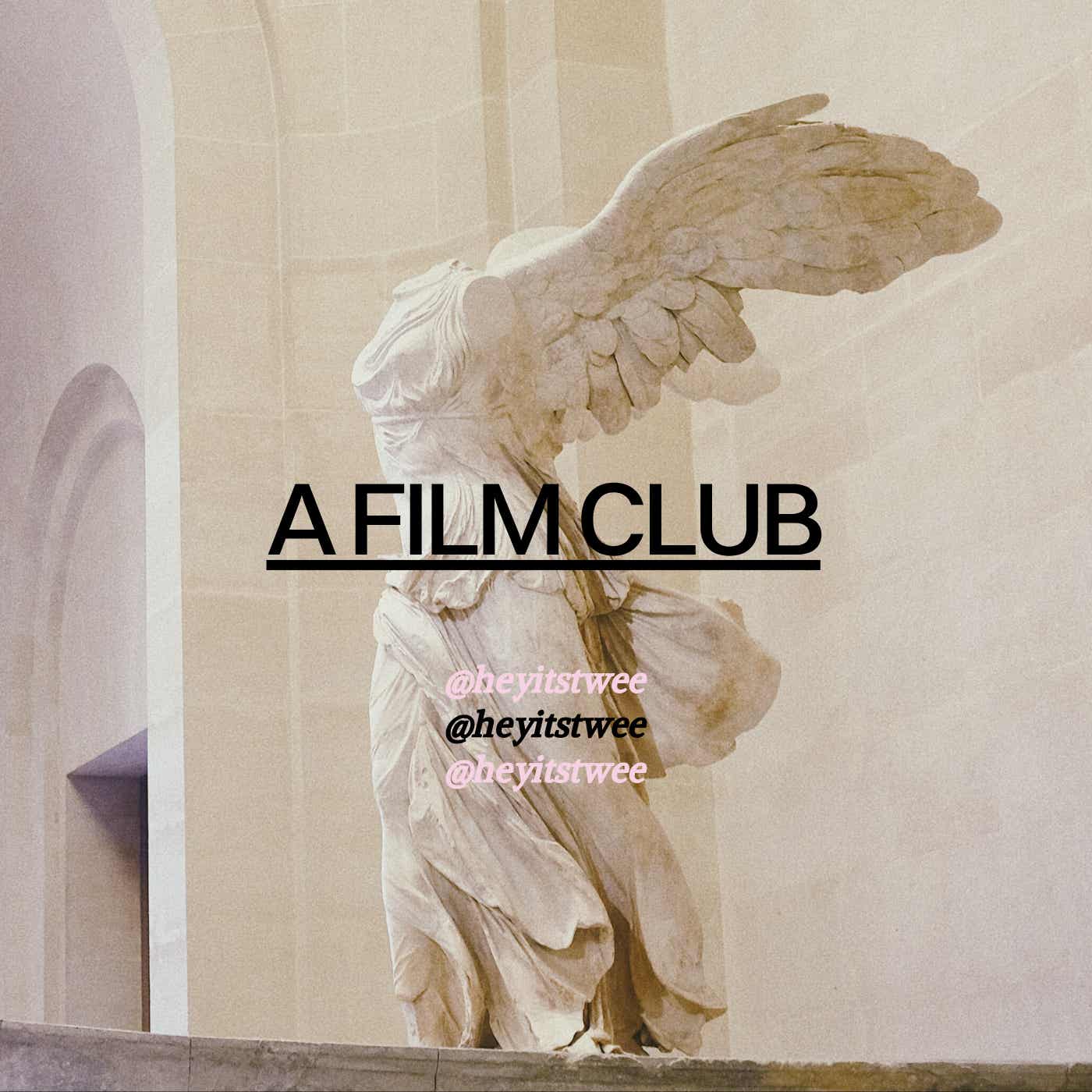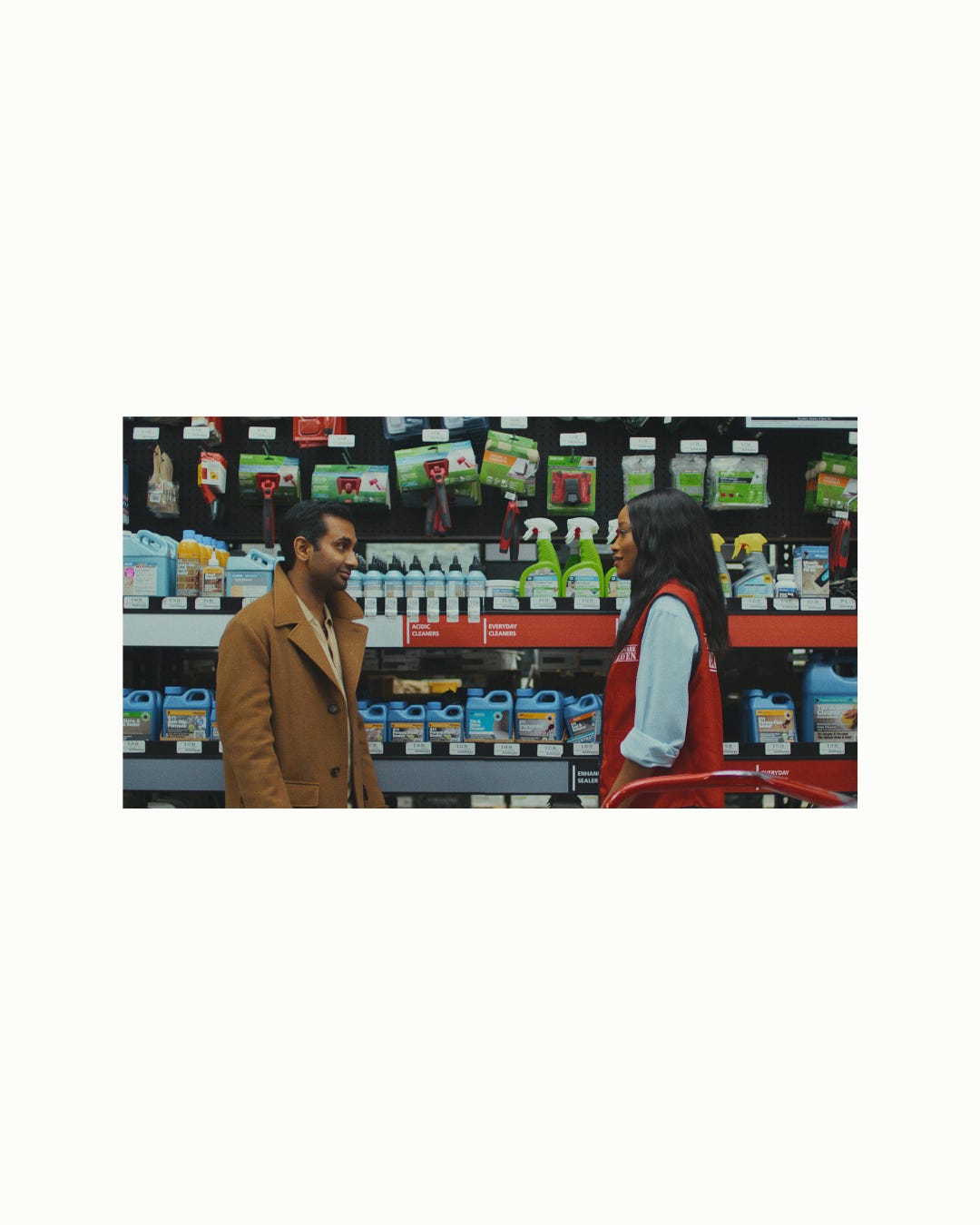heyitstwee, a film club podcast

heyitstwee, a film club podcast
Podcast Description
anxious film girlie in sydney talking to people in front of and behind the camera heyitstwee.substack.com
Podcast Insights
Content Themes
Examines costume design, representation in cinema, and fashion trends with episodes discussing topics like the influence of thrift shopping for film wardrobes, the significance of wardrobe choices in character development, and the creative process behind iconic costumes from popular films.

anxious film girlie in sydney talking to people in front of and behind the camera
For comedian Aziz Ansari, the cost of living crisis has seen art imitate life. He recently tried his hand at gig work with DoorDash and it’s inspired his directorial debut called Good Fortune, a comedy that sees a delivery driver swap lives with a tech CEO of a delivery app. It stars Ansari as Arj, a gig worker, Seth Rogen as the CEO of a tech company and Keanu Reeves as Arj’s guardian angel.
In July, during a press day in London for the film, we spoke about researching the gig economy, chicken nuggets and casting Keanu Reeves as an angel gone slightly rogue!!! <3
Good Fortune is in cinemas now & our interview is below (lightly edited for clarity).
✿ ✿ ✿
heyitstwee, a film club is free. But if you’d like to support my work you can always opt-in for a paid subscription :)
This is your first feature film – what made you want to do this story?
AA: I spent a lot of time in LA and you know, it’s such a crazy place. You have this, you have two people like Arj and Jeff, what’s interesting about these guys is you have one guy that’s been blessed by the last 20 years. He’s probably put his money in crypto and works in tech and has this giant house and all this stuff. And then you have the other guy that’s dealing with the other side of America and LA and he’s, you know, lost his job, he’s got a lot of college debt and he’s doing gig work and things to kind of scrape by and and it’s really hard for him.
The idea of putting those two guys together and trying to explore what that means and doing it in a funny way felt like a fun challenge and then when you get to have Keanu Reeves play an Angel, it kind of all came together.
T: I read that you conducted a lot of research for this film, including interviewing gig workers. Was there anything you found that really surprised you?
AA: It’s all in the movie, you know, all of those things that I learned from talking to those people and realizing how prevalent things like; people having to sleep in their car, which is so, so hard and people will be like, “oh, yeah, I’m doing this for a couple days” and it’s like “I’m doing it for a couple weeks” and then it kind of becomes something else.
Just to really spend time with people that do DoorDash and things — I did DoorDash with this guy that we interviewed, like “hey, can I, like, take over the account for a little bit?” And he’s like, “yeah, sure.” And I did it for a couple of hours. You realise, oh, man, this is a lot different and more challenging than you realise. And the way people treat them and everything. I hope in the movie you kind of, after you see it – people have said this who have seen (it) is “oh, I think about the way I treat those people and how I tip them and everything in a much different way after seeing that perspective” you know?
I was thinking that too, because I became so aware now of how much tipping helps and all of those things after seeing this movie. And I felt like the film is really empathetic. Did making this film teach you anything new about life?
AA: Yeah, I mean spending all that time talking to those people I interviewed and everything, it just made me realise all the things that are in the movie that Jeff kind of experiences and learns by the end — I had my version of that even just doing this process. In terms of making the movie, it was just such an incredible experience to make my first film with Seth and Keanu and I hadn’t done comedy in a while, I’ve been doing more dramatic stuff recently, and to do a comedy again was so fun.
Even in the screenings we’ve done so far to just see a theatre full of people, laughing and being in a theatre together, you know, that’s one thing that’s really important to me is people seeing it in the theatre because it’s something that’s kind of gone away.
Like Seth used to do all these movies like ‘Pineapple Express’ and ‘Super Bad’ and ‘40-Year-Old Virgin’. I remember going to the theatre and laughing with a group of people. Now it’s like, you know, comedy is kind of gone more into TV series and things like that. I hope with this movie it starts the trend again of people being in the cinema and enjoying these movies together and laughing with your friends. And not just sitting at home and keeping it on in the background while you’re, you know, texting or whatever.
I read an interview and I think it was related to this how you said ‘Barbie’ kind of gave you hope that comedies could be successful on a large scale.
AA: I mean when people say like “ohh comedies don’t work at theatres”, I’m like, well, “which ones are you talking about? Cause no, none of them have been made, you know. And ‘Barbie’ is an amazing movie and it’s a comedy. Everyone was laughing the whole time I was there. You know, it’s so funny and that kind of made me feel like, oh, if we can do something big and, you know, we have Keanu playing an Angel and all this stuff that hopefully we can kind of get a similar excitement to the idea of seeing it in the theatre and not just watching it at home.
Keanu Reeves’ character Gabriel has this kind of epiphany when he becomes human and experiences things for the first time, like dancing and chicken nuggies. What did you most want to explore in relation to this?
AA: I just love the idea of Keanu’s character, you know, not knowing anything about what it is to be human and all of a sudden he’s just dropped in the deep end. He’s now a guy that’s struggling to get by in LA. He has to become a dishwasher. He starts off like, oh man, “this is great!”. Then by the end, he’s smoking cigarettes, he’s drinking and it was so fun to see him go on that journey of being excited to be like, “no, this is so harsh!” and how hard it is. He was so great at all of it and made me laugh so much.
In terms of filmmaking, where do you want to go next and what kind of stories do you want to?
AA: Oh man, I don’t know if I can tell you, but I have two other scripts ready to go, so if you guys go to ‘Good Fortune’ and see it a bunch of times, I’ll get to make those other ones hopefully.
But yeah, I have two things. One is like kind of a smaller idea that’s like, oh, it’s kind of like the ‘Master of None’ series I did on Netflix. It’s a lot about relationships and people talking and things like that.
And then I have another idea that’s a crazier idea, that’s kind of more of a sci-fi idea, which I’m really excited about. someone told me Christopher Nolan when he’s like editing his movies, he starts writing the next one. So I was like, alright, I’m gonna try that. And so I started writing while I was editing a little bit and I finished this script that I’m really excited about.
But it’s too early to say much about it, but I’d love to keep making movies. I had such a great time. I feel like I learned so much that I think I’d be even better doing the next ones.
I feel like this movie is so topical, especially with cost of living, even here in Australia. Do you feel like it’s an issue that we should be talking more about of in art?
AA: If you look at other time periods of history where there’s been this kind of moment this is always in movies and stuff. If you look at movies like ‘Trading Places’ or, you know even further back, ‘It’s A Wonderful Life’ deals with this kind of stuff. It’s in there. There’s stuff about, you know, wealth and equality and things like that.
I’m in England now, there’s a lot of of films. The British kitchen sink genre dealing with people that were in the this moment of frustration that Arj has, where it’s like I did everything I was supposed to do – I went to college, I got a degree. I did good in school and and now I’m just burdened by debt. I can’t get a job in the thing I studied and everything keeps kind of feels stacked against you.
When we did the early screenings, I looked at what people said and wrote in the little cards they give out and so many people were like, “yeah, I’ve dealt with this. I understand what this guy’s going through, and I’m so glad to see this on screen” cause to me the whole point is like, if you’re someone dealing with that, like you’re not alone like everyone -so many people are are dealing with this stuff and and hopefully the movie makes everyone think about it more.
It definitely made me think about it. Is there a message you’d like viewers to specifically take away from this film?
AA: You know, when I was working on the movie, I was like, what is this really about? And it to me it’s really about that character Arj and he just doesn’t have hope anymore. So my hope is that if you’re someone that’s struggling and you have your own version of whatever this character is dealing with is that you don’t give up and that you’re able to keep hope and that I hope things will be OK.
Warmest virtual hugs
Thuy
Get full access to heyitstwee, a film club at heyitstwee.substack.com/subscribe

Disclaimer
This podcast’s information is provided for general reference and was obtained from publicly accessible sources. The Podcast Collaborative neither produces nor verifies the content, accuracy, or suitability of this podcast. Views and opinions belong solely to the podcast creators and guests.
For a complete disclaimer, please see our Full Disclaimer on the archive page. The Podcast Collaborative bears no responsibility for the podcast’s themes, language, or overall content. Listener discretion is advised. Read our Terms of Use and Privacy Policy for more details.